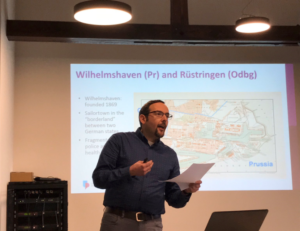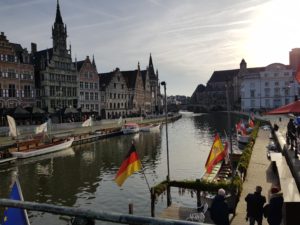PTUC’s Dr Mathias Seiter and Dr Melanie Bassett were honoured to be invited to the SHiP network’s latest workshop, hosted by the University of Ghent. SHiP, or Studying the History of Health in Port Cities, is funded by the Dutch Research Council (NWO). They are led by Professor Angelique Janssens (Radboud University, the Netherlands) and comprise an extensive network of partners from universities across Europe.
The core research of SHiP has been to undertake an ambitious data-collection and classification project which has used individual-level cause-of-death data for the entire population of select European port cities for the period 1850-1950. Indeed, as was evident in the core discussions throughout the day, the intricacies of finding reliable primary source evidence, and rationalising the data into a universal ‘code’ that could be analysed in the future was not an easy task. The group have been using the International Statistical Classification of Diseases and Related Health Problems 10th Revision, or IDC10, as it is more affectionately known within the group. However, local and national administrative processes, and the historical understanding and declaration of causes of death over time, has made the construction of their data sets very complex. An exciting aspect of the project is that such close attention to the data and innovation within the study may lead to new classifications for diseases and a greater understanding of epidemiology and the history of health. The discussions offered a fascinating insight into using statistical and quantitative methodologies to understand port city health data.

Dr Mathias Seiter sharing his research into Wilhelmshaven and Kiel ‘sailortowns’ (photo credit: Hilde Sommerseth)
Drs Bassett and Seiter were invited to provide insight into the work of PTUC, who employ a social and cultural history methodology to the study of port towns and cities. Dr Bassett highlighted recent research undertaken by the group and ways it could be used to further understand the health histories of port settlements. She also showcased the Sailortown app created by the group and offered ways in which the data could be geo-located and interpreted spatially within a historical context. Dr Seiter then presented his research on the German naval settlements of Wilhelmshaven and Kiel; two areas which came under strict control by the local authorities in an attempt to regulate ‘sailortown’ and the naval personnel residing in the area. Dr Seiter’s paper (part of a joint study comparing Germany and Britain, soon to be published with PTUC’s Professor Brad Beaven) focused on the question of how administrative authorities managed unhealthy behaviour, such as excessive drinking, or using the services of prostitutes which could lead to the spread of sexually transmitted diseases. He demonstrated how the SHiP data could be employed to further understand port town health, and also some areas where port-focused cause-of-death data might not be so helpful in port settlements due to the high number of migrant or transient workers.
Overall, the workshop highlighted the different approaches to understanding the history of health in port cities and towns, and opened up new ways for our respective networks to collaborate with each other. We wish the SHiP project every success and hope we can collaborate with the network in the future.











Comments are closed.